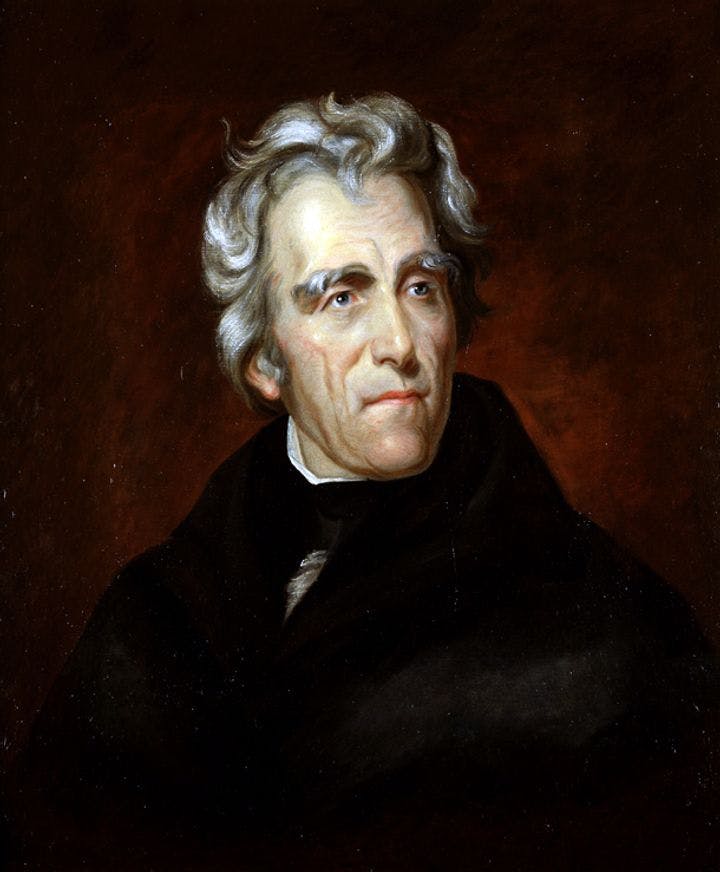Spring 2008
The Age of Jackson, Minus Its Leading Man
– Steven Lagerfeld
The era usually referred to as “Jacksonian” may actually owe little to Old Hickory.
After a long run of popular books about the American Revolution and its heroes, Founders fever may have run its course. What Hath God Wrought is a compelling invitation to move on to the next great epoch of American history. The period from the end of the War of 1812 to the conclusion of the inglorious Mexican-American War in 1848 was defined less by its leading figures—from Kentucky statesman Henry Clay to abolitionist Frederick Douglass—than by the rapid expansion of population and industry that transformed the United States into a modern democracy.
Daniel Walker Howe, an emeritus professor at the University of California, Los Angeles, and Oxford University, takes his title from the message that Samuel F. B. Morse, inventor of the telegraph, tapped out in 1844 when he demonstrated his creation to national leaders in Washington. It was the climactic moment in a revolution in communications, Howe writes, that “laid a foundation not only for widespread economic betterment . . . but also for political democracy: in newspapers and magazines, in post offices, in nationwide movements to influence public opinion, and in mass political parties.” Tellingly, the telegraph had its first practical application in reporting the results of the Whig Party convention that year. The other revolution of the age was in transportation: Canals and the booming railroads unified the nation as never before. Andrew Jackson arrived in Washington for his 1829 presidential inauguration in a carriage and left eight years later on a train.
But Howe is having none of the convention that dubs this the Jacksonian Era. Universal white male suffrage, the great political achievement of the era, owed little to Old Hickory. Howe’s Jackson is a vain, strutting, power-hungry figure, an imperial president if ever there was one. A die-hard white supremacist, he worked to extend slavery and regarded the rising abolitionists as “monsters.” When the new printing and paper technologies gave rise to a vigorous abolitionist press, Jackson successfully connived with his postmaster general to prevent delivery of its publications in the South, perhaps “the largest peacetime violation of civil liberty in U.S. history.” With guns and bogus treaties, his brutal policy of Indian removal drove some 46,000 Native Americans from their lands east of the Mississippi to make way for white settlers. “The president personally intervened frequently,” Howe writes, “always on behalf of haste, sometimes on behalf of economy, but never on behalf of humanity, honesty, or careful planning.”
Many academic historians only grudgingly acknowledge the influence of religion in American history, but Howe is careful to trace its powerful currents. The reforming Protestant spirit animated the nation’s belief in progress, rationality, and science—it was no accident that Morse chose a phrase from the Bible for his message—and reform campaigns such as those against slavery and Indian removal. The era’s final year saw the birth of the modern drive for women’s rights at the Seneca Falls Convention in upstate New York, sparked in part by the Quaker evangelist Lucretia Mott (who thought the ordination of women a more important goal than suffrage).
Howe illuminates the era’s great debates—should the federal government promote economic modernization by investing in roads and other “internal improvements,” operating a second Bank of the United States, and maintaining protective tariffs?—and shines a welcome light on many less known subjects, such as the Anti-Masonic movement. He incorporates material from the past few decades’ “history from below,” with brief excursions on subjects as various as slave rebellions, the advance of dentistry, and minstrel shows, but never fails to keep his eye on the larger events, trends, and people that defined the era.
Connoisseurs of scholarly debates about the period will find plenty of delicacies, but Howe’s arguments—America really is an “exceptional” nation, for example—are submerged in his masterly narrative. Even at more than 800 pages, this book is somehow still a marvel of compression, with vast amounts of scholarship integrated into a vivid history that shows Americans their nation in all its greatness, and its occasional squalor.
* * *
Steven Lagerfeld is the editor of The Wilson Quarterly.
Reviewed: "What Hath God Wrought: The Transformation of America, 1815-1848" by Daniel Walker Howe, Oxford University Press, 2007.
Image courtesy of Wikimedia Commons
